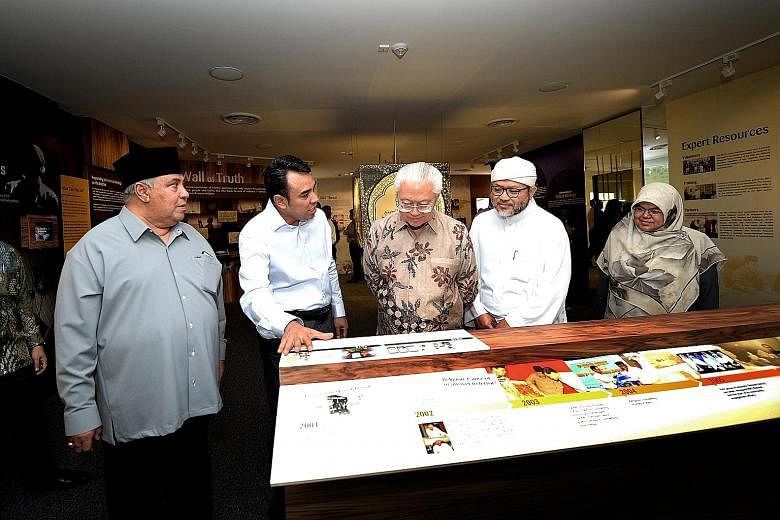When President Tony Tan Keng Yam launched a resource and counselling centre at Khadijah Mosque to counter radical ideology in 2014, the Islamic State in Iraq and Syria (ISIS) was still a budding threat.
More than two years on, the centre run by the Religious Rehabilitation Group (RRG) displays panels on ISIS and its flawed ideology, in response to the extremist group's emergence as the new face of terror.
Dr Tan viewed these panels and was briefed on new initiatives the RRG has rolled out to combat the evolving threat of terrorism yesterday when he returned for his second visit to the centre.
The measures include a helpline started in 2015 and a mobile application launched last year that can be used for private chats with RRG counsellors.
The RRG, a group of Islamic religious teachers and academics, was set up over a decade ago to counsel Jemaah Islamiah detainees.
Speaking to reporters after his tour, Dr Tan said he was pleased to hear that the RRG continues to expand its outreach efforts and methods to adapt, given that ISIS has become a real threat.
RRG vice-chairman Mohamed Ali said that when the centre was started in July 2014, the information panels focused more on Al-Qaeda.
But the RRG has since updated its materials, he said. "As the threat evolves, we need to change."
The long shadow of terror has fallen on Singapore in the past few years.
Pointing to how an ISIS-linked Batam cell's plot to launch a rocket at Marina Bay was foiled just last year, Dr Tan said the Republic is a "legitimate target" of a terrorist attack.
Youth here are being radicalised, and a small number of Singaporeans have joined the fight in Syria and Iraq. Foreigners living and working here too have fallen prey to radical ideology, Dr Tan added, noting how 40 radicalised Bangladeshis were nabbed in recent years.
Every person has to play a part in combating radicalism, instead of leaving the task to the Government or the RRG, he said.
He cited the nationwide SGSecure initiative launched last year, which aims to build up community vigilance, cohesion and resilience.
When an attack happens here, society must have the means to recover, and not allow it to disrupt social cohesion, he said. "That's very important because (that disruption is) what the terrorists want."
But at the same time, people should not become paranoid and live in a constant climate of fear, Dr Tan added.
"Terrorism is like a disease, and you cannot be a hypochondriac, always worrying about falling sick. Otherwise you cannot live your life," he said. "So we have to carry on with our lives as usual and take sensible precautions."
Singapore must also continue to promote harmony and understanding among the different races, religions and cultures here, he added.
"We have to make sure we are alert and that we have all these ways to combat this menace which threatens our very existence," said Dr Tan.
"Because, racial and religious harmony is the cornerstone of Singapore's existence, survival and prosperity."


